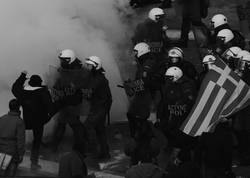Even after the culmination of negotiations among European Union member states, Grecians have found little avail as a second bailout package emerged early last Tuesday morning.
Finance ministers met Monday in Brussels with two objectives. The first concentrated on imposing stricter economic sanctions on Greece, and the second addressed whether the nation could eventually survive on its own.
With the finalization of last Monday’s talks, Greece walked away with a second bailout package, valued at euro130 billion ($170 billion). An earlier package was approved in 2010 by private lenders for euro100 billion ($130 billion).
Time Magazine reported the Euro surged seven tenth of a percentage to $1.328 within minutes of the bailout announcement.
This deal was essential for Athens to avoid default next month.
Greece’s Parliament had the weekend to review and sign a 400plus spending cuts and the new bailout package are focused on keeping the banks heads above water rather than sustaining the body of its country.
Graffiti stained storefronts embody the country’s fragile condition and the smell of tear gas continuously infuses the streets of Athens, enveloping the violent facades since 2008.
Rachel Donadio from The New York Times reported on February 25, “The first time I visited Athens the city was in flames. It was December 2008. [The riots were] set off after a policeman’s bullet killed a teenager [and] engulfed the city. For several days, the rule of law was tenuous at best.”
Without the second bailout Greece would be forced to return to its old Drachma currency, further weakening fragile economic ties to the Eurozone.
Dr. Kenneth Mitchell, Associate Professor of Political Science at Monmouth University also commented on last Tuesday’s bailout developments. “Today Greece is insolvent, as it was prior to the latest bailout. This second bailout kicks the can down the road, say, to early
PHOTO COURTESY of washingtonpost.com




